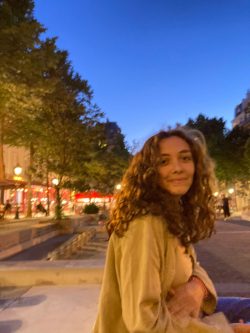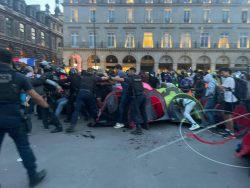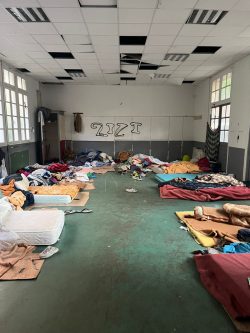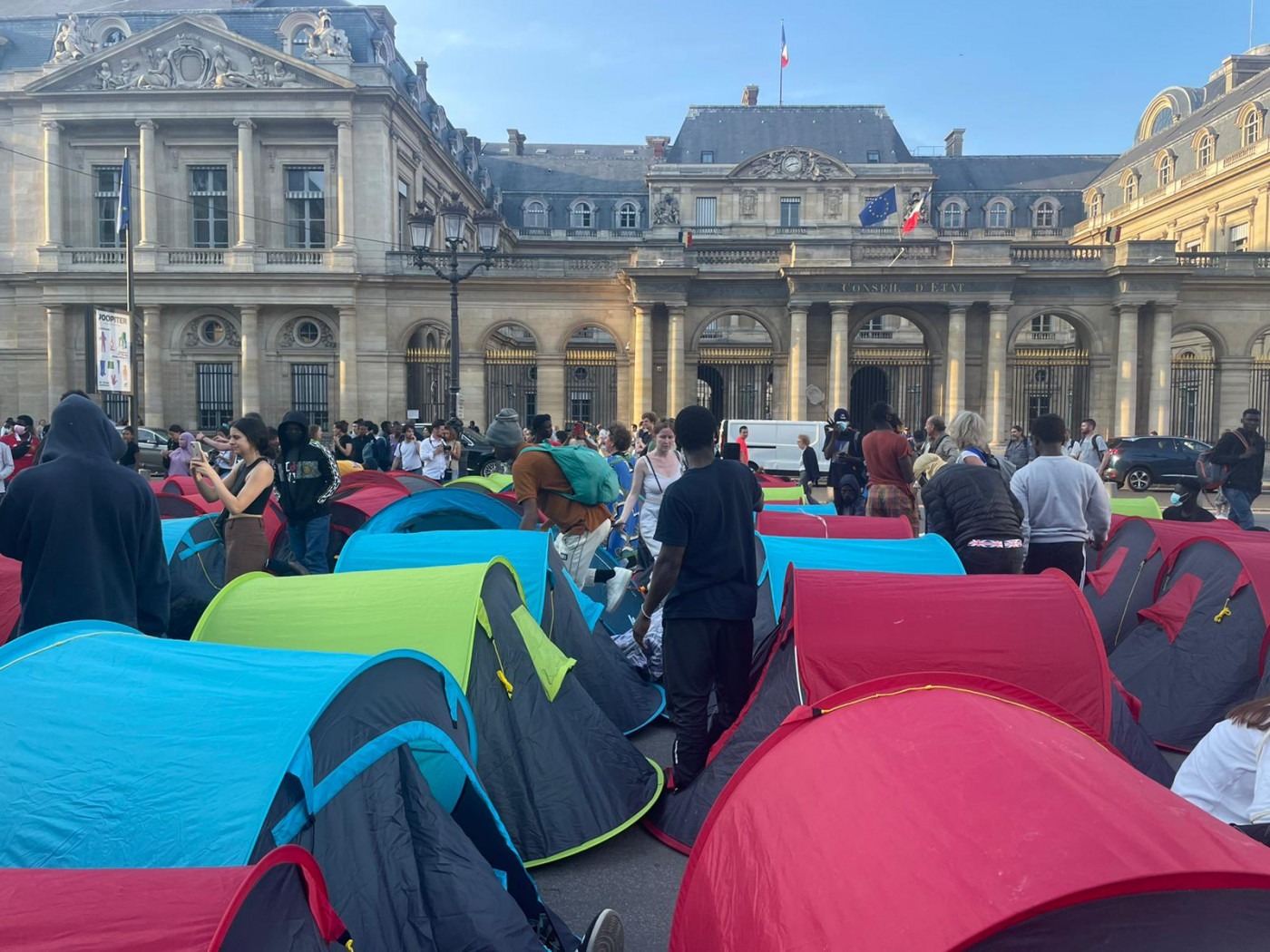Interview with Yaëlle, refugee action volunteer
Yaëlle and I have been friends since high school – we have seen each other’s paths to (young) adulthood since leaving the Pays de Gex (France) where we partly grew up. After finishing school, Yaëlle went to Paris and studied Literature and Humanities for two years in prépa in the Lycée Louis-le-Grand, before completing a double-degree in Philosophy and Law at la Sorbonne. This year, she is volunteering with refugees in Rome, working with two different associations. I interviewed her to share her experiences of as a volunteer who works with refugees, in the midst of a strained political climate, amid more severe laws being enacted in numerous EU countries.
The interview was conducted in French, which I then translated.

Q: You now work for the organisation “Medici Contro la Tortura” (Doctors Against Torture) in Rome. You are similarly working with the organisation Baobab Experience. Can you explain to me what these associations consist of, and what goals they want to achieve?
The association “Medici Contro la Tortura” gives social, medical, psychological, and legal assistance to refugees who have experienced torture, either in their country of origin or during their journey to Europe. Doctors give certificates attesting to the fact that the refugees have been tortured – hence the name. After this has been established, the organisation’s goal is to help them integrate society. Torture aims to isolate – it excludes people from normalcy, and can stem from racial, social, gendered discrimination – the goal here is to help people “feel” normal again and have access to a socially integrated life. That is the psychologists’ mission when they work with the refugees.
“Baobab Experience” is very much focused on concrete experiences to, once again, help people integrate society. It organises food banks; proposes Italian classes, cultural animations, and aims to ease professional insertion into society. It also gives legal advice for refugees (knowing their rights, helping them gain access to them…). It answers the urgent needs of the refugees.
Q: What is your role in these associations, and who are you in contact with? Why did you choose to go to Rome?
In the “Médecins Contre la Torture”, I am a half-intern, half-volunteer. I do a lot of accounting and get to understand how the association’s financing works. I also assist the briefings that the psychologist and cultural and linguistic mediator do. Every week, they will have a meeting with the refugee, so they can talk about how it’s going – before that, they do a briefing without them, and I am allowed to be there. I also participate in the therapeutic workshops, as well as some art classes. But my contact is quite limited – the refugees’ safety and privacy, as well as their psychological integrity, is very well respected.
In the other association, I do more “classic” volunteering work, and am more in contact with actual people. I give classes, distribute food, participate in the animations… once again, it comes down to the possibility for them to lead a normal life, and be able to integrate society more easily.
Q: Can you retrace your steps that made you do a gap year dedicated to volunteering – did your studies encourage you in this path, and what other experiences have you had that relate to what you are now doing? Is there any way in which this lifestyle is difficult?
Volunteering is linked to my studies in the sense that it relates to politics and philosophy, but ultimately, I wanted, after these years spent in abstract thinking, to do something concrete. A real-life application of what I know.
I started volunteering with refugees during the Fall holidays, in high school with Yezidi women and children arriving from Iraq – it was a short experience, but very intense. June and July 2023, I volunteered with “Mineurs Non Accompagnés” in Paris (Unaccompanied Minors), which was one of the most intense experiences I have ever lived. There is an aspect of knowing that you’re doing something good, of course, (we laugh), but more profoundly, you meet people and interact with tragedies that truly make you think. That’s also the hard aspect of volunteering, that we don’t always talk enough about: knowing how much to invest of yourself. Once you’re in it, it can quickly become a black hole, where you want to sacrifice yourself. The balance is hard to find. It’s especially hard to confront yourself to people who have nothing, whose lives have been eviscerated, and compare it to your own life, which is normal. It’s hard to confront yourself to that feeling of injustice. But you need to preserve your mental health – for everyone’s sake. Otherwise, you do nothing, you don’t help anyone. It’s romantic to be miserable, but it’s not very efficient.
Q: Do you have a moment that particularly moved or shocked you as a volunteer?
A moment in Paris did – when I was working with the Unaccompanied Minors. They have no home, so the four associations that were taking care of them were squatting in an abandoned school. Eventually we were expelled by the local authority. As a sign of protest, we sat in front of the Palais-Royal; there were at least 300 minors, with their tents, sitting, and a couple hundred volunteers around them. Of course, it was pacifist. The police arrived (the protest had not been declared) and started encircling us. More and more police arrived; half an hour later, there were as many policemen as there were volunteers. And then they received orders to disperse the protest.
It was incredibly violent – especially towards the refugees. The volunteers were trying to protect them – trying to stop the police from walking to the tents – but there were too many of them, and once they got to the tents, they grabbed the kids and started ripping the tents apart. It was extremely brutal, and many racist comments were heard: “They’re screaming like animals”. At some point, they started using tear gas, mere meters away from us and the kids. 6 refugees were hospitalised that night, 2 in psychiatric urgent care, and that’s not counting the aftermath (in the next few days, more refugees had to go to hospital).
After dispersing us, the policemen urged us to “go home” – a rather ironic saying, given that the reason for the protest in the first place was that they had been evicted from the squat. They escorted us to a park where the kids could spend the night; at 6:30am the next day, they had to leave. Since then, they have been dispersed in Paris whilst waiting for their appeal (still waiting to be recognized as minors).

It was the first time that I was confronted to police brutality; the reasoning behind the dispersion was absurd; and the blatant racism of the authorities towards the refugees was incredibly striking
It was a particularly shocking moment. It was the first time that I was confronted to police brutality; the reasoning behind the dispersion was absurd; and the blatant racism of the authorities towards the refugees was incredibly striking. It’s not a common volunteering experience, either.
Another story that moved me… it’s for very different reasons. The 14th of July, the kids were told by the authorities of the park that they were staying at that they had to leave for a couple of hours (they usually let them stay there for the night). We realised that it was because families were coming near it to see the fireworks – you had a great view just below the park. I walked around with Idris, one of the refugees, for a little bit, and then we saw the fireworks; it was incredibly bizarre to see all these families having fun, seeing the fireworks, enjoying the fourteenth of July, and not realising that their being there was stopping dozens of unaccompanied minors from sleeping. How could they know? At some point, Idris sighed and said, “I’m tired, let me sleep”. Those kids have to walk around all day. They have nothing else to do but walk. They have to wake up at 6 to leave the park, when it opens; they have to walk to food banks; they have to walk to live. And now they couldn’t sleep. The difference in lives – in chance – felt weird.
Q: Do you think countries of the European Union – specifically France and Italy – are doing enough for the refugees?
They’re not doing that much to begin with – and it’s getting worse.
Italy just renewed a pact with Libya, stipulating that all migrants that were intercepted during their journey can be sent back to Libya. Libya is hell on earth for migrants. The centres are like prisons, and it’s terrible to be kept there.
Laws are increasingly severe. The UN denounced the 2017 Italian Law number 110 on torture to not adequately reflect what it meant to be tortured – specifically, it restricts people’s chance of being admitted to having been tortured. Italy has quite an extremist government. Finding a house, finding a job, is nearly impossible for a refugee. There is racism everywhere – on certain house announcements, it’s written “No to foreigners”.
We’ve had lawyers at the four associations that work with the youths stand in front of the police station, urging the kids not to sign any papers – we’ve also had to distribute the message massively
As for France, I’ve already talked about police violence. Legislatively, it’s also very stringent. Recognition of minority, for instance. If you’re recognized as a minor, the state gives you housing, access to school, opportunities; but to be recognized as a minor, the procedure is hell. When you first go to the prefecture, you have an interview with someone who tries to figure out if you’re a minor or not, based on what you say your journey has been. France was called out by the Defensor of Human Rights in 2022, as well as by the European Council, for subjective criteria when it comes to determining a refugee’s age. There’s no presumption of minority in France, which is a huge issue.
During that interview, the refugee is housed and fed; after that week, if he is not successful, he is let out on the street. That was the case for all the kids I knew in the squat. You can appeal, but it takes weeks or months for your case to go forward – and if that doesn’t work out, you need to appeal again to someone else.
For a couple of weeks now, we’ve had the police department set a few traps. Sometimes, when you’re on the street, a police van picks you up and brings you to a centre where you are housed and fed. After which you are led to the police station and offered to ask for asylum. But that procedure is reserved for adults! Those who sign it automatically cancel all the procedures they have done for the last few months, trying to prove that they are minors. We’ve had lawyers at the four associations that work with the youths stand in front of the police station, urging the kids not to sign any papers – we’ve also had to distribute the message massively.
It’s very sly.
The new law on immigration, la loi Darmanin, will also facilitate the possibility of expulsion, restrict medical aid to urgent care, and stop audiences from being performed in collegiality but will now have a unique judge. That’s another example of a law that goes backwards in terms of helping refugees. Darmanin even said “We’ll be mean with the mean ones, and nice with the nice ones”. That’s not a particularly appropriate sentence to use when talking about people’s lives.

Q: What are your projects for the future?
I might want to go to Lampedusa to do more intense humanitarian work – that’ll be where migrants actually arrive in Italy. On the long-term, start my studies again next year. I want to learn about violence. I’ll study a master’s in political philosophy, and will focus on violence, and what it does to people, how it affects their lives.

Comments